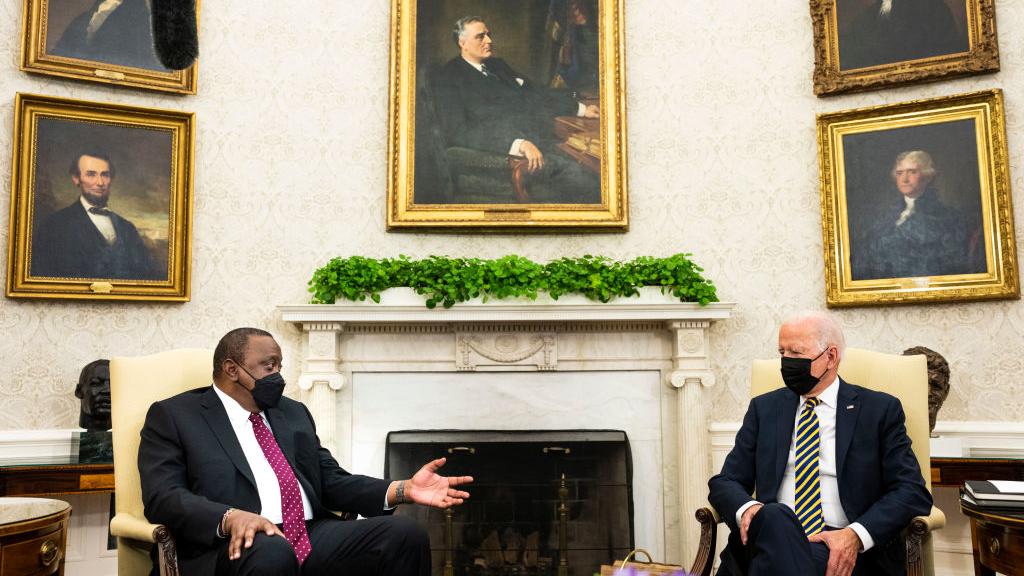
U.S. President Joe Biden (R) meets with Uhuru Kenyatta, president of the Republic of Kenya, in the Oval Office of the White House in Washington, D.C., October 14, 2021. /Getty
U.S. President Joe Biden (R) meets with Uhuru Kenyatta, president of the Republic of Kenya, in the Oval Office of the White House in Washington, D.C., October 14, 2021. /Getty
Editor's note: Stephen Ndegwa is a Nairobi-based communication expert, lecturer-scholar at the United States International University-Africa, author and international affairs columnist. The article reflects the author's opinions and not necessarily the views of CGTN.
In a rather surprising invitation, U.S. President Joe Biden hosted Kenya's President Uhuru Kenyatta to the White House on October 14.
Well, it is not difficult to figure out the reasons why Kenya was given the priority. For decades in independent Africa, Kenya has acted as a bastion of Western interests particularly in the horn of Africa, and South Sahara region in general. This is based on the fact that Kenya was a British colony and is also centrally located in the region.
But pundits posit that there was more to the foregoing as Kenya has grown, in two short decades, to become one of China's biggest partners in Africa. Therefore, Biden was curious to gauge, at least from the body language of the Kenyan delegation, how far the country had moved to the East.
The official version of the meeting's agenda comprised the usual patronizing fair. According to the White House statement, main areas of discussion centered on "defending democracy and human rights, advancing regional peace and security, and accelerating economic prosperity through climate smart solutions and the use of renewable energy resources."
The picture would not have been complete without a dose of COVID-19 diplomacy, with Biden promising cooperation on both vaccine manufacturing and donations. There were also discussions on transparency and accountability in domestic and global financial systems, and the search for peaceful resolutions to the conflicts in Somalia and Ethiopia.
But there was hardly any mention of the real issues facing Kenya, particularly on poverty alleviation, which remains the country's biggest challenge since independence. It is not difficult to see why though, since it would be an indictment of the millions of dollars in both aid and grants that the U.S. has offered to the country for development purposes. It has been a case of giving with one hand and taking it back with the other.
Contrary to America's carrot and stick policy, China's bilateral and multilateral relations with Africa are an open book. There are no hidden cards waiting to be put on the table just before or after the deal is done. China's model of development cooperation has met with more success as it is concrete-based, not liquid. The money goes straight to intended projects with no strings attached.
Biden's overtures in Africa are a case of Johnny-come-lately as China has effectively filled the void left by Donald Trump who really had no time or concern for what he derogatorily referred to as "shithole countries."
What has changed since Trump's departure is unclear since Biden's administration has no stated policy of international relations with Africa either. His engagement is emerging as a mix and mash of his predecessors' approaches and attitudes.

The Mombasa-Nairobi Railway opens to traffic in Mombasa, Kenya, May 30, 2017. /CFP
The Mombasa-Nairobi Railway opens to traffic in Mombasa, Kenya, May 30, 2017. /CFP
Analysts wonder which light has suddenly dawned on Biden, apart from growing U.S. desperation to counter China's rising influence in Africa. Obviously, Biden's strategy is to steal the thunder from its rival's growing relations with the resource rich continent and curb the former's geopolitical footprint.
Let us take a look at one of Biden's promises to Kenya and Africa – support in the fight against COVID-19 – and juxtapose it with what China has offered so far, or has promised to offer.
Although Kenya received the first batch of China's Sinopharm COVID-19 vaccine doses in September, Sino-Africa cooperation in the fight against the pandemic dates as early 2020 when China donated ventilators, face masks and personal protective equipment to Kenya, and shared its knowledge on pandemic control and prevention.
Biden's real intentions were inadvertently betrayed by Republican U.S. Senator Jim Risch, a ranking member of the Senate Foreign Relations Committee who in comments before the two presidents meeting lamented about Kenya's increasing debt to China. Although this did not feature in the Biden-Uhuru meeting, the cat was already out of the bag.
Biden's unstated frustration is that Kenya and Africa have never expressed resentment about Chinese loans, unless it is under the behest of the U.S. It is instructive that Uhuru did not express such sentiments either in his meeting with Biden. With struggling Western economies, the U.S. could be in panic from lack of carrots to dangle to Africa, leaving China to fill in the vacuum.
On matters of economic prosperity, Chinese investments have had great positive impact in Africa as a whole not just through foreign direct investment, but also through the numerous infrastructural projects that have opened up many remote but resource rich parts of the continent.
Chinese signature transformational projects in Kenya include the Mombasa-Naivasha Standard Gauge Railway, the Nairobi Expressway currently under construction, the Thika Superhighway and the Lamu Port South Sudan Ethiopia Transport Corridor.
Suffice it to say that with China, Africa is in a safe place. U.S. attempts to counter the status quo must be cognizant that Sino-Africa relations have gone too far and too deep to be uprooted by the old order.
(If you want to contribute and have specific expertise, please contact us at opinions@cgtn.com.)

